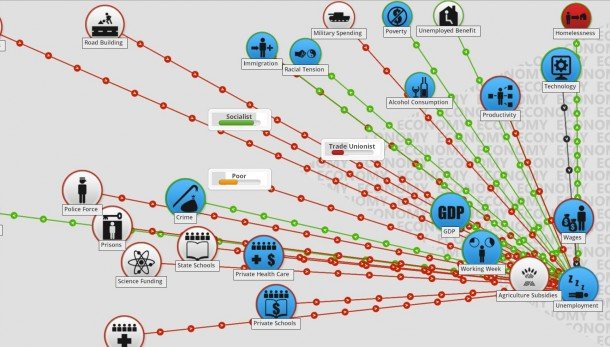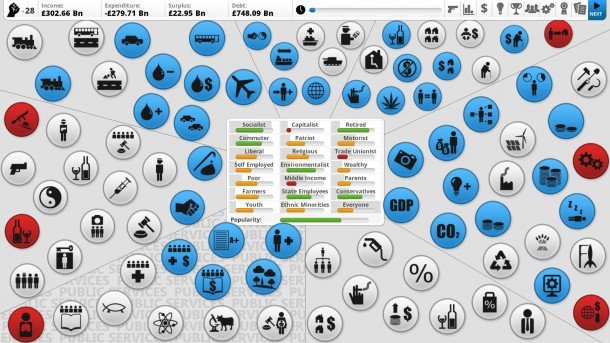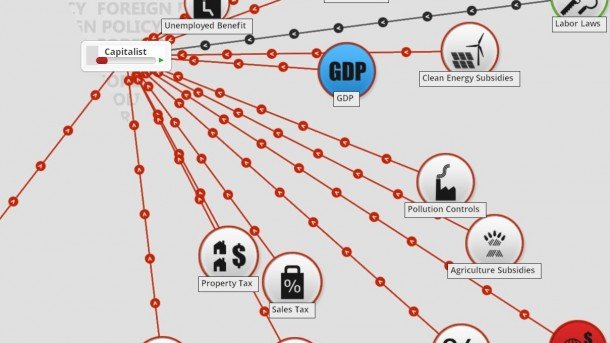Now playing: abolishing crime and banning booze in Democracy 3

The interface for a sim that lets you run a country is always going to be daunting, but Democracy 3's fearsome array of orbs made me want to ALT-F4 and hurry to the kettle for a calming cup of something hot. That feeling lasted only minutes. After the briefest investigation, the quality of Democracy's interface becomes clear. It's a fine example of how thoughtful design can present complex data simply and allow complex strategies to be enacted with simple interactions, like the tug of a slider or the tick of a checkbox.
It closely resembles Democracy 2's layout. Each blob represents a social issue. Hover your mouse over one and green and red spokes appear indicating all of the issues that positively or negatively affect your chosen subject. It takes two seconds to discover that the racial tension, alcohol and organised crime are fuelling violent crime, and that those are being countered by a combination of CCTV surveillance, a well funded police force, education and strict handgun laws. I can click on any of those contributing factors to access sliders that'll let me adjust taxation and alter the legislative strictness around problematic comsumables like booze. Tackling my nation's drinking habit would turn out to be the start of a long slippery slope.
I took control of the United Kingdom. GDP was in the pits and I could see that the main contributing factors were the global economy - couldn't do much about that - and productivity. I followed the nodes and found that the key contributing factor to productivity was alcohol abuse. That's driven, I discovered, by alcohol consumption. Oh, and poverty and unemployment, but one thing at a time.
If I could stop people drinking, my people would work harder. I doubled alcohol consumption to 50% and banned strong lagers, and then used the predicted increase in tax revenue to drop income tax for middle income families, who thought I was Satan thanks to income tax, property tax and inheritance tax levels. Capitalists hated me too, but that was largely down to my rotten inherited GDP figure, which I was trying to fix by stopping everyone from having fun.

Democracy 3 moves on in three-month turns. Two turns later and I'd managed to turn my £22bn surplus into a £70bn deficit. On the plus side, there was no crime . Crime was a concept relegated to memory for my citizens, and all it took was a huge hike in the intelligence agency budget, a boost in surveillance technology, and the obliteration of alcohol as a financially viable form of entertainment.
It may come a surprise to say that I did start out trying to run the country according to my personal moral framework, which does not include any hatred for beer, or a desire that my country should be run by a shadowy organisation of super spies. I enjoyed Democracy 3 too much as a puzzle box to constrain myself with mere moral boundaries, but while wildly wrangling the levers on this social engineering sim is fun, there appears to be a cost for extreme action.
I noticed in a turn report that The Human Rights Society had started criticising me on the radio. The intelligence briefing screen told two things, 1. The Human Rights Society represented a significant threat to my rule, and 2. I had increasingly serious beef with The Wildlife Society for reasons I still don't understand. In previous Democracy games, you could easily be assassinated for going too extreme too quickly. That's worrying, because I'm pretty sure as a citizen I'd have assassinated myself by now.
Keep up to date with the most important stories and the best deals, as picked by the PC Gamer team.

"Can I assassinate them before they assassinate me?" I immediately wondered, completing my swift journey from centrist, slightly left-leaning tea drinker to totally evil berk. I'm still not sure "kill your enemies" is an option in Democracy 3, but there's a main menu option dedicated to mods. A Dictatorship 3 total conversion could be good fun.
For all the silliness, I think there's educational value to Democracy 3's vision of society as a series of complex interlocking systems, and the depiction of politicians as figures charged with managing them. Politics isn't taught in the UK as a matter of course due to the dangers of colouring such education with a political leaning one way or the other. Even though it's a mathematical construct, Democracy 3 isn't entirely apolitical (the correlation between handgun management and crime reduction would be challenged in certain quarters of US politics, for example), but it's close enough to be useful. After an hour of meddling, you gain an instinctive understanding of how important taxation can be as a behaviour changing tool, or how economic fluctuations might punish one population group, but not another.
For a youngster whose only exposure to issues of governance has been public political debate, a single look at Democracy 3's entwined nodes may prove enlightening. Broadcast politics boils big issues down to reductionist snippets suited to public consumption, Democracy 3 opens them up and lets you explore, meddle, and see just how easily things can break. It's not just instructive, it's a downright pleasure.
Democracy 3 is available now from the Democracy 3 site .
Part of the UK team, Tom was with PC Gamer at the very beginning of the website's launch—first as a news writer, and then as online editor until his departure in 2020. His specialties are strategy games, action RPGs, hack ‘n slash games, digital card games… basically anything that he can fit on a hard drive. His final boss form is Deckard Cain.


